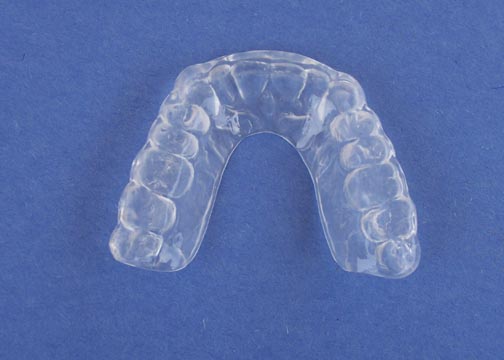Ways to Keep From Grinding Your Teeth

Teeth grinding, also known as bruxism, is a dental condition that can cause a great deal of harm to your teeth. Problems stemming from teeth grinding can include broken, chipped and cracked teeth, frequent earaches, neckaches, headaches, sensitive teeth and soreness of jaw muscles.
People grind their teeth most commonly at night, but it can also happen during the day. Teeth grinding is an unconscious habit, but there are many ways to correct or even prevent this condition.
Daily Diet and Exercise
It’s well-known that diet and exercise can have far-reaching positive or negative effects on our daily lives, including whether or not we grind our teeth. Caffeine is a stimulant that can aggravate the tendency to grind your teeth. Alcohol, while a depressant, can also trigger bruxism.
A balanced diet full of fruits, vegetables, whole grains and lean meats will help you feel balanced and reduce stress. Exercising in some form at least once a day can also relieve stress by releasing mood-enhancing endorphins, helping you to avoid teeth grinding during sleep. Walking, jogging and yoga are beneficial exercise regimens that don’t require any additional equipment, just practice – and all will help alleviate the symptoms and practice of teeth grinding.
A Good Night’s Sleep
There’s no substitution for getting a restful night’s sleep. If you find that you have trouble settling down, read for awhile  before falling asleep. Apply a heating pad or warm compress to your jaw, relaxing the muscles, and add the soothing smell of lavender to help you relax. If possible, go to sleep on your back, which decreases the pressure on your jaw joints and can help prevent teeth grinding.
before falling asleep. Apply a heating pad or warm compress to your jaw, relaxing the muscles, and add the soothing smell of lavender to help you relax. If possible, go to sleep on your back, which decreases the pressure on your jaw joints and can help prevent teeth grinding.
Guard Your Smile
If you become aware that you’re grinding your teeth, it’s possible that a medical condition is contributing to this habit. Make an appointment with your dentist to evaluate whether or not this is the case, as well as if any of your current dental work is contributing to the problem.
If grinding your teeth is causing extensive harm, it may be that you’ll need a mouth guard (also called a bite splint or night guard). The process for finding the mouth guard that’s right for you is largely trial and error. Begin with the most common and inexpensive mouth guard, like the ones used by athletes. If that doesn’t work, there are dental guards that you can buy over-the-counter in drug stores. Finally, if these don’t work, check with your dentist about a professionally-made night guard that will work for you.
